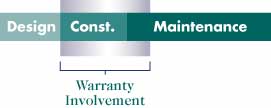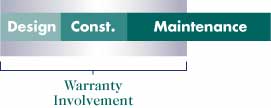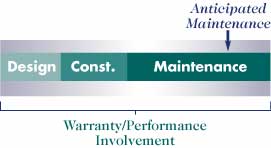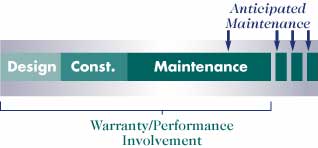U.S. Department of Transportation
Federal Highway Administration
1200 New Jersey Avenue, SE
Washington, DC 20590
202-366-4000
U.S. highway agencies are discussing and, to some extent, implementing warranty contracts on asphalt paving projects. These highway agencies believe they will receive improved performance from warranty contracts through a reduction in life cycle costs and introduction of contractor ingenuity during the design and construction process. In addition, these agencies see warranty contracting as a methodology for dealing with reduced staffing levels and a loss of expertise in the agencies. Concerns over definitions, roles, responsibilities, and appropriate allocation of risk are of major concern among all stakeholders. The European highway community has a long history with the use of short-term and long-term warranty contracting. This change toward the use of warranties in the United States, combined with the knowledge of warranties in Europe, led to the formation of the European Asphalt Pavement Warranties Scan. The goal of the scan was to learn from European experience to help develop a successful warranty program in the United States.
A warranty is a type of performance-based contract that guarantees the integrity of a product and the constructor's responsibility for the repair or replacement of defects. Traditional U.S. construction contracts typically require the contractor to provide project warranty for only 1 year after construction is complete; however, the design life cycle for all types of asphalt pavement is much longer than 1 year. U.S. highway agencies are increasingly requesting longer-term warranty contracts on asphalt paving projects. These highway agencies believe they will receive improved performance from warranty contracts and believe that warranty contracting may reduce life cycle costs by increasing contractor ingenuity during the construction process. Asphalt pavement warranties have the potential to help U.S. highway associations cope with staffing shortages and the loss of experienced staff by potentially reducing project administration and overall construction costs.
Several studies of European asphalt pavement techniques in the early 1990s identified the use of warranties (FHWA 1990; FHWA 1994). Some European highway agencies have been using asphalt pavement warranties for more than 40 years. In recognition of the similarities and benefits that could result from an examination of European warranty practices, a diverse team of experts was assembled to research, document, and promote the implementation of best practices found in Europe that might benefit U.S. practitioners. The Federal Highway Administration (FHWA) and the American Association of State Highway and Transportation Officials (AASHTO) jointly sponsored this study, under the guidance of the FHWA Office of International Programs and the National Cooperative Highway Research Program (NCHRP).
In September 2002, a U.S. panel traveled to Europe to review and document the policies and strategies used in Europe to determine risk assessment and administer warranty contracts. The scan team also reviewed the criteria, programs, and analytical tools used to establish pavement distress criteria for warranting asphalt pavement performance. Specifically, the panel went to Europe to study the following:
Methodologies used to determine risk assessment for the government agency and contractor.
Methodologies for administration of warranty contracts.
Methodologies to select criteria to account for traditional performance indicators of rutting, fatigue cracking, and low temperature cracking.
Practices to maintain prescribed levels of smoothness and skid resistance.
Criteria used in successful asphalt pavement warranties.
Pavement performance prediction tools.
The panel evaluated policies and practices for potential application in the United States. It conducted meetings with representatives of government agencies, academia, and private sector organizations involved with warranties and visited sites where innovative asphalt warranty contracting techniques were being applied. The U.S. participants also shared their viewpoints and experiences in the spirit of mutually beneficial exchanges. The panel visited or met with representatives from Denmark, Germany, Spain, Sweden, and the United Kingdom.
The following summary observations are provided to set a context for the key findings, conclusions, and recommendations of this study. As noted in the summary observations, the European and U.S. transportation communities are quite similar in terms of the political, financial, and resource challenges that they face. However, the European transportation agencies are better leveraging the innovative management techniques, technical innovations, and financing capabilities that the private sector has to offer. There is a more spirited effort of partnership and collaboration between the public and private sectors in Europe than in the United States. The summary observations listed below are expanded upon throughout this report.
The European host countries have a long history of warranties on pavement construction. These countries have employed material and workmanship warranties for decades. Although their warranty programs have developed independently through either government specification or industry promotion, all of the countries believe that warranties have improved the quality of their highway systems. Figure E1 provides an overview of the warranty types observed on the scan, the countries that employ them, and their respective durations.
At a minimum, all of the host countries use material and workmanship warranties on their traditional contracts. These warranties ensure that the contractor will build the pavement as specified by the owner and fix any defects resulting from the use of improper materials or inferior installation. Depending on the country, the highway agencies may seek a remedy of defects from either the prime contractor or the asphalt contractor, if the prime is not the asphalt contractor.
Warranty periods vary. On projects designed by the highway agency, the United Kingdom uses a 1-year warranty period, Spain employs a 1-year warranty period, and Germany historically uses a 4-year period. These countries use performance indicators of rutting, cracking, and durability on material and workmanship warranties.

Figure E2: Material and workmanship warranties.
Denmark and Sweden use performance warranties on their traditional contracts. The United Kingdom employs performance warranties on its design-build contracts, which have become their contracting method of choice over the past 10 years. A performance warranty includes material and workmanship, but since the contractor is responsible for some or all of the pavement design, it includes performance of the complete asphalt pavement.
All three countries use a 5-year warranty period for performance warranties. Although the design life of asphalt pavements is much greater than 5 years, that period provides for adequate performance measurement of the product without unduly burdening the contractor to warranty the product for the entire design life. In addition to rutting, cracking, and durability, performance measure of smoothness and friction are often used.
Performance warranties allow for contractor innovation in mix design and/or material installation. The host countries described varying levels of innovation that stemmed from the use of performance warranties, but all countries described a greater level of innovation than was available through material and workmanship warranties.

Figure E3: Performance warranties
All five of the host countries use best-value procurement in lieu of low bid. Best-value procurement involves awarding the contract on technical and/or performance items in addition to cost. Best-value criteria include safety, innovation, and environmental impact. Denmark also includes the bidding of additional years of warranty as a best-value criterion. In some cases, prequalification was used as a filter in the best-value process. Although the best-value criteria and weights varied, all of the hosts stated that it was critical to their warranty program. For warranties to function effectively, highway agencies and the industry must have a higher level of trust and greater confidence in the contractor's ability to perform. Best-value procurement is one mechanism to promote this trust and confidence.
Similarly to the United States, the European hosts are dealing with growing capital project needs, as well as a backlog of maintenance needs. They are also dealing with a shortage of staff and a changing role of government. All of the host countries are looking at alternative contracting as a mechanism to increase innovation without creating a burden on highway agency staff. Pavement performance contracts (PPCs) and DBFO contracts are extending warranty contracts up to 35 years and assisting with the growing needs.
Pavement Performance Contracts-PPCs extend performance warranties to include a warranty period that is closer to the design life of the pavement. In a PPC, the contractor is responsible for designing, constructing, and maintaining the performance of the pavement to prespecified levels. All of the host countries are employing or experimenting with some variety of pavement performance warranties, which have warranty periods of 11 to 20 years. In Germany, Spain, and the United Kingdom, the highway agencies are promoting PPCs. However, the industry is the catalyst for PPCs in Denmark and Sweden. In all of the countries, the PPC forms are developing with close government and industry collaboration.
Depending on how the contractor proposes to build the pavement, the maintenance can include a number of items from filling of isolated potholes and minor pavement remarking to a complete mill and overlay of a significant section of pavement. The highway agencies are simply looking to the industry to provide a pavement that performs to prespecified standards. The PPCs allow for much more innovation from the industry; however, the industry must be willing to take a substantial risk. The contractors must have design, construction, and maintenance competencies to compete for PPCs.

Figure E4: Pavement performance contracts.
Design-Build-Finance-Operate Contracts-In Spain and the United Kingdom, the highway agencies are changing from service providers to owners and managers of the highway system. Both of these countries are turning a small fraction of their highway network over to the private sector for long-term financing, operation, and maintenance. The terms of the DBFO contracts studied on this scan were 25 to 30 years, but other European countries are experimenting with even longer periods. Drivers for the use of DBFO contracts range from a lack of public funding to a belief that private financing and maintenance delivers a higher quality product and provides benchmarks for public sector performance.
It should be noted that none of the host countries are using PPCs or DBFOs as a "silver bullet" for their transportation needs. Rather, they are taking a balanced contracting approach through the use of a variety of warranty contracts described in this document.

Figure E5: Design-build-finance-operate contracts.
The European host countries all believe that their long history of warranty application has improved the performance of their highway and trunk road systems. Their warranty systems continue to evolve through a customer-focused partnership between government and industry. Best-value procurement and prequalification are vital elements of the warranty system. Material and workmanship warranties are in use on all short-term warranties. Five-year performance warranties are in use when the contractor completes some level of design. The long-term performance warranties include design, construction, and some type of planned maintenance. The Europeans hosts use all of these warranties in balanced contracting approaches.
The European Asphalt Pavement Warranties Scan team included representatives from Federal, State, and local agencies, industry, and academia. The scan team offers the following recommendations on the basis of its observations of successful warranty programs in the European host countries.
Warranty requirements: The Federal government should require short-term material and workmanship warranties on all federally funded projects. This should be the first step in moving toward common use of long-term performance warranties in the future.
Enable best-value and prequalification legislation: Assist with enabling legislation to allow contract awards based on technical and quality factors in addition to cost (i.e., best-value and prequalification methods).
Warranty resource center: Create resource center(s) to facilitate and assist in implementing and evaluating warranties. The Federal government should act as a leader for the State, county, and local governments.
Create model warranty documents: Draft contract documents for warranty implementation with representation from all stakeholders. AASHTO should take the lead in the creation of these documents in collaboration with local governments and industry.
Implement material and workmanship warranties: The State and local highway agencies should develop material and workmanship warranty programs through internal education and industry participation.
Implement short-term performance warranties: State and local highway agencies should implement short-term performance warranties when it is appropriate for the contractor to perform the necessary design.
Enable best-value and prequalification procedures: State and local highway agencies should work to enable legislation allowing contract awards based on technical and quality factors in addition to cost.
Education: Develop an awareness and understanding of warranty issues and risks.
Participation: Proactively participate in roundtable discussions on warranties.
Pilot projects: Consider proposing on pilot projects.
Operation and maintenance competencies: Consider expanding knowledge of operation and expertise of materials and products for future competitiveness.
| << Previous | Contents | Next >> |